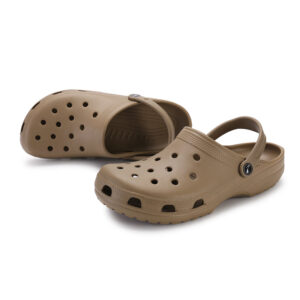If you have foot conditions or specific foot concerns, there are some additional features you may want to consider when selecting garden shoes.
Here are a few features that can be beneficial:
Arch Support: If you have flat feet or low arches, look for garden shoes that offer good arch support. Adequate arch support can help alleviate discomfort and provide stability while working in the garden.
Cushioning: If you experience foot pain or have sensitive feet, consider garden shoes with extra cushioning. Shoes with cushioned insoles or midsoles can help absorb impact and provide additional comfort.
Removable Insoles: Some garden shoes come with removable insoles. This feature allows you to replace the existing insoles with custom orthotics or inserts that provide better support or accommodate specific foot conditions.
Wide Width Options: If you have wider feet or certain foot conditions like bunions or hammertoes, look for garden shoes that offer wide width options. This can provide a more accommodating and comfortable fit.
Adjustable Straps or Closures: For individuals with foot conditions that require a customized fit or easy adjustability, garden shoes with adjustable straps, buckles, or closures can be beneficial. These features allow you to customize the fit and accommodate any swelling or specific foot needs.
Non-Irritating Materials: If you have sensitive skin or foot conditions that are prone to irritation, consider garden shoes made from soft, non-abrasive materials. Look for shoes with smooth linings and minimal seams to reduce the risk of friction or rubbing.
Lightweight and Flexible: Opt for garden shoes that are lightweight and flexible. These characteristics can enhance comfort and allow for natural foot movement, which can be beneficial for individuals with certain foot conditions.
Remember, it’s essential to consult with a healthcare professional or podiatrist who can provide specific recommendations based on your foot condition. China garden shoes suppliers They can offer personalized advice and guidance on choosing the right garden shoes that suit your needs and help alleviate any foot-related concerns.
What are some common foot conditions that may require specialized garden shoes?
There are several common foot conditions that may benefit from specialized garden shoes. Here are a few examples:
Plantar Fasciitis: Plantar fasciitis is a condition characterized by inflammation of the plantar fascia, a band of tissue that runs along the bottom of the foot. People with plantar fasciitis often experience heel pain. Garden shoes with good arch support, cushioning, and shock absorption can help alleviate symptoms and provide relief.
Bunions: Bunions are bony protrusions that develop at the base of the big toe. They can be painful and sensitive to pressure. Garden shoes with a wide toe box and soft, non-constricting materials can help reduce friction and pressure on the bunion area.
Hammertoes: Hammertoes occur when the toes become bent or curled due to muscle imbalances. They can cause discomfort and difficulty fitting into regular shoes. Garden shoes with a roomy toe box and flexible materials can accommodate hammertoes and reduce pressure on the affected toes.
Morton’s Neuroma: Morton’s neuroma is a condition characterized by a thickening of the tissue around the nerves leading to the toes. It often causes pain, tingling, or numbness in the ball of the foot. Garden shoes with a wide toe box and ample cushioning in the forefoot area can help relieve pressure on the affected area.
Diabetic Foot Conditions: Individuals with diabetes need to take extra care of their feet. Diabetes can lead to reduced sensation, poor circulation, and increased risk of foot ulcers. Garden shoes for diabetics should have a wide and deep toe box, cushioning, and a non-binding fit to prevent pressure points and accommodate any potential foot deformities.
Arthritis: Arthritis can cause joint pain, stiffness, and limited mobility. Garden shoes with good cushioning, shock absorption, and supportive features can help reduce impact and provide comfort for individuals with arthritis.
Neuropathy: Neuropathy refers to nerve damage, often resulting in tingling, numbness, or loss of sensation in the feet. Garden shoes with a cushioned and supportive design can help protect the feet and minimize the risk of injury.
These are just a few examples of foot conditions that may require specialized garden shoes. It’s important to consult with a healthcare professional or podiatrist for personalized advice and recommendations based on your specific foot condition. They can provide guidance on finding the right footwear to support your feet and alleviate any symptoms or discomfort you may experience.
